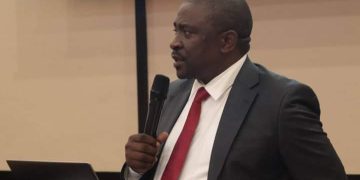
Maseru – In a bold move toward fostering inclusion and accessibility, Vodacom Lesotho, through the Vodacom Lesotho Foundation, has officially launched the Braille versions of its Vodacom Foundation booklet and the Vodacom Consumer Protection Code . The launch, held in Maseru, marks a significant step in ensuring that persons with disabilities have equal access to critical information about their rights and services.
The translated materials are part of Vodacom’s broader initiative to promote inclusive education and sustainable growth. The Vodacom Consumer Protection Code, which was initially launched last year, aims to ensure that all Vodacom products and services are accessible.
Ts’epo Ntaopane, a representative of Vodacom Lesotho Foundation, emphasised the company’s commitment to “leaving no one behind”-whether due to lack of resources or impairments. “Too often, when we design services, we only look at ourselves. This code is our vow to make life easier for all our consumers. If any group is left behind, then we too are lagging behind as a company,” he said.
He further highlighted Vodacom’s investment in partnerships to advance this vision, including collaborations with the Resource Centre for the Blind, St. Catherine’s High School, and the National University of Lesotho (NUL). “These partnerships aim to support learning and independence for people with visual impairments and expand future access efforts, including the introduction of materials in sign language” he said.
“Our goal is to make access and inclusion central to everything we do. This is our pledge to the nation,” concluded Ntaopane.
Refiloe Hape Sesinyi, speaking on behalf of the Lesotho National Federation of Organisations of the Disabled (LNFOD),welcomed Vodacom’s continued commitment to disability rights. “For far too long, people with disabilities have been left behind due to lack of access to information. Access to information is a critical component of the Sustainable Development Goals and is affirmed by Lesotho’s own Persons with Disability Equity Act of 2021,” she said.
Sesinyi also urged stakeholders to consider the needs of people with intellectual disabilities who benefit from learning through visual aids. She referenced a 2023 LNFOD study on gender disparities, which found that people with disabilities face significant barriers in accessing education, healthcare, gender-based violence support services, and economic empowerment, largely due to limited access to information.
Vodacom Lesotho CEO, Mohale Ralebitso, echoed these sentiments, stressing that true progress lies in ensuring inclusion becomes the norm rather than the exception. “We’re working to make inclusion our default. It’s not just about connectivity- it’s about empowerment. Everyone must be in a position to make informed decisions,” he said.
Ralebitso also underscored the need for collaborative efforts in driving inclusive development. “This isn’t a competition. We need to complement one another to empower the most vulnerable. Inclusion must be a societal imperative. The most vulnerable should not be the last we think about- they should be the first.”
‘Mathabo Pama, Director of Disability Services at the Ministry of Gender, Youth, and Social Development, described the Braille booklets as more than just documents- they are “a symbol of inclusion in action.” She praised the initiative as a bold and meaningful step toward the realization of the rights of people living with disabilities and commended Vodacom for aligning its corporate social responsibility with national development goals.
“These booklets ensure that no citizen is left behind. They enable full and equal participation in society,” she said. “Let this launch serve as a catalyst for continued and expanded collaboration between government, the private sector, civil society, and organizations of persons with disabilities. Together, we can dismantle barriers, change mindsets, and ensure that inclusion becomes the norm, not the exception.”
Pama also highlighted the ministry’s ongoing work, which includes developing accessibility standards and guidelines, ensuring private service providers incorporate accessibility, and training stakeholders to recognize and address barriers to inclusion.
The sad reality remains; people with disabilities may have rights- like the right to access information- but those rights often remain out of reach due to systemic barriers. Vodacom’s initiative is a powerful reminder that inclusion requires deliberate action.





